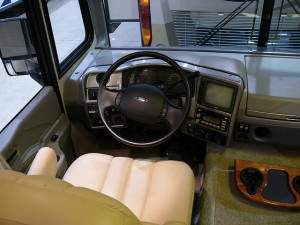
 Now that I’ve made a commitment to buy a Class A motor coach and begin my life after retirement I think life may change a great deal and hopefully for the better.
Now that I’ve made a commitment to buy a Class A motor coach and begin my life after retirement I think life may change a great deal and hopefully for the better.
This is a 36’ or larger land barge that’s 12’ tall that you see other old farts driving down the highway at 60 mph and believe me there is a reason for that slow driving speed – these beasts get 7-10 mpg, have 60 – 100 gallon fuel tanks and driving a reasonable ‘suggested speed’ gets the most out of its fuel capacity.
With fuel here at $1.97.9 per gallon that isn’t a bad deal but when it goes back to $3 then ouch!!!
Mine has a 65 gallon tank meaning if I drive like the manufacturer suggests I can go about 600 miles before a fill up – so it’s best to plan where you are going or just throw your wallet and cash out the window.
The one saving grace is your house is with you wherever you go, your memories and all your stuff. But remember this beast is usually under 400 sf and storage is limited even with basement storage which is four partial – three full width bus like bins under the motor coach floor.
Another factor is weight, a motor coach of this size has a usual towing capacity of 5,000 pounds and you must remember what is inside the coach has weight too and it’s best to avoid having more than 1,000 pounds spread around the inside and in lower level basement storage as this can affect the handling and definitely the mileage.
 Storage and smart item placement
Storage and smart item placement
One of the most intelligent things a new owner can do is talk to other RV owners to have a complete understanding of how to store your everyday items so when you’re going down the road and make a turn they don’t begin flying out of cupboards, spilling out the refrigerator and leaving a huge mess all over your floor.
Tires – what you’ll be buying
When you are buying tires on your family car they usually run $75-$125 and on a typical motor coach with 16-inch tires are not much different except they will be much heavier ply’s up to 17 ply and meant to carry extreme loads and there will be 10 tires not 4 like your car.
Going further is it worth the cost?
Many people choose to install additional fuel capacity and while this may sound practical and it can be even a 40 gallon tank can weigh 60 pounds and the extra fuel an additional 320 pounds – it may extend your driving distance to over 1,000 miles but will still require refueling costing $250 – $300 and the extra tank along with professional installation will run about $500. An average rig will cost $0.40 per miles to operate to include fuel, tires and wear.
10 mpg may sound awful for a car but not bad for a house…








